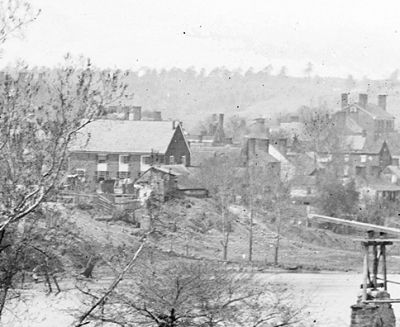Situated at the midpoint of the 100 miles separating Washington DC, the United States capital, and Richmond, Virginia, the Confederate capital, the city of Fredericksburg has thus far been spared any direct impact of the war. The situation changes dramatically today, Good Friday, when Union troops appear on the north bank of the Rappahannock River directly opposite the town.
Fredericksburg has actively engaged in the war effort and a significant Confederate military presence has been attendant for some time. Today’s sudden appearance of blue-clad soldiers creates a huge stir throughout this genteel and placid community. The Confederate forces withdraw, merchants shutter and secure their establishments, and citizens wail at the thought of falling under the authority of the Union forces. The sense of desperation among the many of the townspeople is summed up in a diary entry by Helen Bernard:
Good Friday, 1862. I write while the smoke of the burning bridges, depot, & boats, is resting like a heavy cloud all around the horizons towards Fredcksbg. The enemy are in possession of Falmouth, our force on this side too weak to resist them…. We are not at all frightened but stunned & bewildered waiting for the end. Will they shell Fbg., will our homes on the river be all destroyed? …. It is heartsickening to think of having our beautiful valley that we have so loved and admired all overrun & desolated by our bitter enemies, whose sole object is to subjugate & plunder the South…..
Other residents, however, experience very different emotions at the sight of the Union soldiers. John Washington is a 23 year-old slave and a devoted member of the African Baptist Church, which is situated on the bank of the Rappahannock in the city. Hearing commotion in the street outside, Washington runs to the roof of the Shakespeare Hotel in which he works to peer across the river. Reflecting later on his feelings at that moment, Washington recorded in his diary:
“Was Good Friday, the day was a mild and pleasant one with the sun shining brightly and everything unusually quiet, the Hotel Was crowed(sic) with boarders who was seated at breakfast a rumor had been circulated amoung them that the Yankees were advancing but nobody seemed to believe it, until Every body was startled by several reports of cannon…Every white man was out of the house. Every man servant was out on the house top looking over the River at the Yankees for their glistening bayonets could easily be seen I could not begin to Express my new born hopes for I felt like I was certain of My freedom now.”
Just a few days later, Washington crosses the river, enters the Union lines, and embraces his newfound freedom. Over the next few months more than 10,000 other slaves will follow.
While the coming of the armies ushers in freedom for some, it will also bring destruction and desolation the citizens can scarcely imagine. On this holy day, the fury of the war has intruded. For Fredericksburg and her citizens, life will be forever changed.
Sources: David Blight, A Slave No More: Two Men Who Escaped to Freedom, Including Their Own Narratives of Emancipation (link); Rebecca Campbell Light, War at Our Doors: The Civil War Diaries and Letters of the Bernard Sisters of Virginia (link); image (link)
NOTE: This article is authored by Dennis Sacrey, Church Administrator, Fredericksburgh Baptist Church



